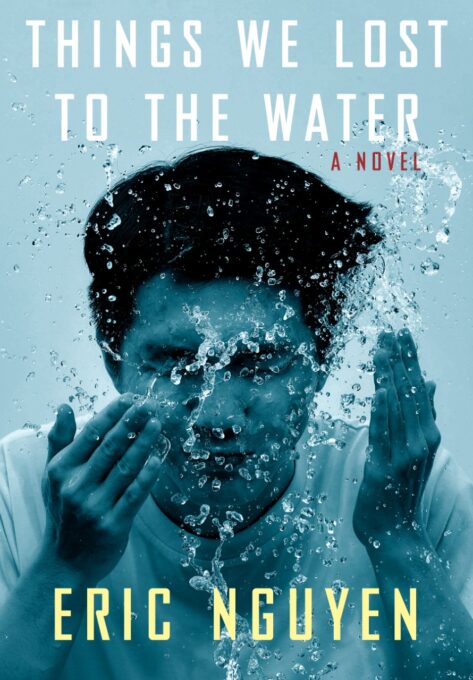
Beyond the fact his parents fled Vietnam in the 1980s as boat people, Eric Nguyen knows very little about who they were or what they lived through before he was born.
“They always had their eye on the future,” the 33-year-old author said in a recent phone call from his home in Washington, D.C. “There’s a lot they haven’t told me.”
Like so many others in his generation, Nguyen has never pressed his family hard for answers. Not only did he want to move on as he’d been taught to do, but he also had little desire to bring up painful memories for his refugee parents.

But by the time he started pursuing his graduate degree in creative writing from McNeese State University in Louisiana, it became impossible to ignore the obvious questions he’d been holding in all his life.
“Why would they leave Vietnam? Why would they go into the water?”
Nguyen’s forthcoming novel, Things We Lost to the Water, is an attempt to find answers.
Over the last nine years, what started as a classroom assignment with a clear beginning and end has had countless iterations and plot changes in between. Nguyen knew he wanted to anchor the story on Hương, a Vietnamese woman escaping post-war Vietnam by boat with her son and unborn child. Over time, he expanded on the narratives of the two children, who grow up in New Orleans amid the backdrop of a burgeoning Vietnamese community – complete with housing projects, gangs, and an influential Vietnamese Catholic church. The mother flashes back constantly to sweet memories of her life in South Vietnam before 1975, as the wife of an educated professor who is later sent to re-education camp and disappears. The family continues to weather trauma after trauma throughout the 1980s and 1990s, culminating in the ultimate event that will test their bond: Hurricane Katrina.
To be clear, Nguyen says the book is not autobiographical.
While he revisits his old memories as a child of refugees throughout its pages – he remembers how his mother would dress up for parties and being brought along to community events – he says he relied more on firsthand stories gathered while wandering through the Big Easy as a wide-eyed student.
Back in those days, Nguyen would seek out Vietnamese cashiers and restaurant workers during non-busy hours. Time and again, he would see the eyes and expressions of hardened immigrants change from guarded to open as they realized someone was taking interest in their stories.
“While I couldn’t get the hard facts, that’s what fiction is for – to imagine what my parents’ story could have been,” he said of those discussions with countless strangers. “It turns out Vietnamese Americans had lives and identities before the fall of Saigon. I felt they were handing over a gift. It was more than just telling a story. They gave me something to really hold onto.”
Whether these individuals will ever read the book or see themselves within its 300 pages, Nguyen wants them to know they changed his perspective – and stand to influence many more readers.
“I hope this book helps to show their resilience and their strength, even though I’m an outsider,” he said.
When Knopf publishes Nguyen’s book on May 4, he joins an ever-growing league of distinguished Vietnamese diasporic writers, including Pulitzer Prize winning author Viet Thanh Nguyen (The Sympathizer, The Committed), Ocean Vuong (On Earth We’re Briefly Gorgeous), and Nguyen Phan Que Mai (The Mountains Sing).
Nguyen says all are inspirations and paving the way for widespread acceptance of rich, varied stories about Vietnamese experiences. While he admits he feels the pressure to represent the culture accurately, he feels confident that he “tried to get it right.”
Asked whether his parents are proud of the buzz swirling over their son’s pending debut as a novelist, Nguyen replies in a monotone voice, “They’re not the type of people to get excited. To the older generation, I think there’s work to be done to show what a writer can be.”
Ultimately, Nguyen set out to write a book for other Vietnamese Americans like him, who grew up saturated in media that holds up white culture as superior while limiting portrayals of Asians as one-dimensional side characters.
“This is my contribution to the many Vietnamese stories being published in America,” he says. “I’m proud to be part of a growing tradition.”
More than anything, he hopes Vietnamese Americans come away from Things We Lost to the Water with a better understanding and added appreciation for what so many refugees endured to not only survive a war, but to cross an ocean with no guarantee they would reach the other side.
“Their bravery in taking this leap of faith – to get in the water and leave everything they know behind – it takes a lot,” he reiterates at the end of our conversation. “They’ve taught me so much. We are resilient. We figure things out. We know how to move forward.”
Thanh Tan is a journalist and filmmaker based in Seattle.
Anh Eric Nguyễn sẽ nói chuyện qua Zoom vào ngày 4 tháng 5, lúc 6 giờ tối, vé tham dự miễn phí: https://www.eventbrite.com/e/eric-nguyen-author-of-things-we-lost-to-the-water-with-loan-le-tickets-149374875273?

